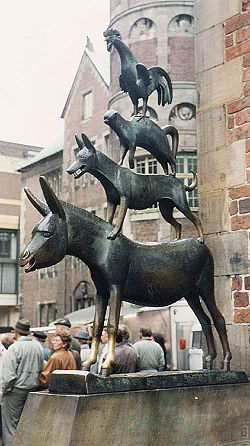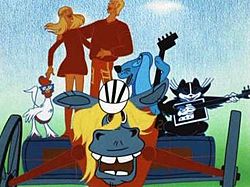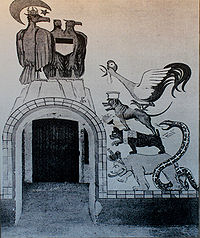- Town Musicians of Bremen
-
 A bronze statue by Gerhard Marcks depicting the Bremen Town Musicians located in Bremen, Germany. The statue was erected in 1953. Note the front hooves that have become shiny. Touching the front hooves is said to make wishes come true.
A bronze statue by Gerhard Marcks depicting the Bremen Town Musicians located in Bremen, Germany. The statue was erected in 1953. Note the front hooves that have become shiny. Touching the front hooves is said to make wishes come true.
The Town Musicians of Bremen (German Die Bremer Stadtmusikanten) is a folktale recorded by the Brothers Grimm. Despite the title of the fairy tale, the characters never actually arrive in Bremen. In Aarne-Thompson classification it is a folk tale of type 130: "outcast animals find a new home".[1]
Contents
Plot
In the story a donkey, a dog, a cat, and a rooster, all past their prime years in life and usefulness on their respective farms, were soon to be discarded or mistreated by their masters. One by one they leave their homes and set out together. They decide to go to Bremen, known for its freedom, to live without owners and become musicians there.
On the way to Bremen, they see a lighted cottage; they look inside and see four robbers enjoying their ill-gotten gains. Standing on each other's backs, they decide to perform for the men in hope of gaining food. Their 'music' has an unanticipated effect; the men run for their lives, not knowing what the strange sound is. The animals take possession of the house, eat a good meal, and settle in for the evening.
Later that night, the robbers return and send one of their members in to investigate. He sees the Cat's eyes shining in the darkness and thinks he is seeing the coals of the fire. He reaches over to light his candle. Things happen in quick succession; the Cat scratches his face with her claws, the Dog bites him on the leg, the Donkey kicks him and the Rooster crows and chases him out the door, screaming. He tells his companions that he was beset by a horrible witch who scratched him with her long fingers (the Cat), an ogre with a knife (the Dog), a giant who had hit him with his club (the Donkey), and worst of all, the judge who screamed in his voice from the rooftop (the Rooster). The robbers abandon the cottage to the strange creatures who have taken it, where the animals live happily for the rest of their days.
In popular culture
 Town Musicians of Bremen, 1969 Soviet animated film
Town Musicians of Bremen, 1969 Soviet animated film
The tale has been retold through animated pictures, motion pictures (often musicals) and theatre plays. Jim Henson produced a version with his Muppets called The Muppet Musicians of Bremen. In the Soviet Union, the story was loosely adapted into an animated musical in 1969 by Yuri Entin and Vasily Livanov at the studio Soyuzmultfilm, Town Musicians of Bremen. It was followed by a sequel called On the Trail of the Town Musicians of Bremen. In 2000, a second 56-minute sequel was made, called The New Bremen Musicians (Но́вые бре́менские, Novyye bremenskiye).[2]
Carl Zuckmayer cites the tale in his 1931 play Der Hauptmann von Köpenick, particularly the line "We can find something better than death anywhere", which becomes a key line for the last part of the plot.
In the mid-1960s, Tupper Saussy wrote a composition titled The Beast with Five Heads on a commission from the Nashville Symphony to teach schoolchildren about orchestration, intended as a substitute for Peter and the Wolf.[3]
In 1976, in Italy, Sergio Bardotti and Luis Enríquez Bacalov adapted the story into a musical play called I Musicanti, which two years later was translated into Portuguese by the Brazilian composer Chico Buarque. The musical play was called Os Saltimbancos, was later released as an album, and became one of the greatest classics for children in Brazil. This version was also made into a movie.[4] In Spain, the story was made into an animated feature film in 1989, directed by Cruz Delgado.[5] In Germany, the story was adapted into an animated feature in 1997 under the title The Fearless Four (Die Furchtlosen Vier), though it varied considerably from the source material.
A persiflage of this tale can be found on the wall in the Fort Napoleon, Oostende, Belgium. Heinrich-Otto Pieper, a German soldier during World War I, painted the German and the Austro-Hungarian eagles throned on a rock, under the light of a Turkish crescent. They look with contempt on the futile efforts of the Town Musicians of Bremen to chase them away. These animals are symbols for the Allied Forces: on top the French cock, standing on the Japanese jackal, standing on the English bulldog, standing on the Russian bear. Italy is depicted as a twisting snake and Belgium a triciolored chafer.
In the early 20th century, the American folk/swing/children's musician Frank Luther popularized the same musical tale as the "Raggletaggletown Singers",[6] presented in children's school music books and performed in children's plays.
Richard Scarry wrote an adaptation of the story in his book Richard Scarry's Animal Nursery Tales in 1975. In it, the donkey, dog, cat and rooster are all fully anthropomorphic (as is the case of all Richard Scarry characters), and set out since they are bored with farming.
On Cartoon Network in between cartoon breaks during the Out of Tune Toons marathon and on Cartoonetwork Video, there are cartoon shorts (called "Wedgies") of an animal band based on the tale called "The Bremen Avenue Experience" featuring a cat (Jessica), dog (Simon), donkey (Barret) and rooster (Tanner). They are either a modern adaptation of Town Musicians of Bremen or descendants of the old musicians of Bremen.
Hello Project's Mini Moni starred in a drama based on the fairy tale called Mini Moni.de Bremen no Ongakutai (Mini Moni's Bremen Town Musicians). The drama goes backwards in time through three periods of Japanese history unveiling the story. The drama does not have much in common with the fairy tale.
In the anime Otogi-Jūshi Akazukin one of the main villains is named Randagio, who is based on the cat of the story as well as on Puss in Boots. He has three underlings that are based on the other three animals from the fairy tale and have a band named Breman.
Nippon Animation Co., Ltd. adapted the tale in the first episode of the anime TV series Grimm Meisaku Gekijou, released in English as Grimm's Fairy Tale Classics. The four main characters are seen in the opening of the anime.
In the video game The Legend of Zelda: Majora's Mask, the Bremen Mask is a reference to the Town Musicians of Bremen.
In the video game Kyuiin, the Town Musicians of Bremen are a boss fight with each animal having its own attack.
Bremen is also the title of a manga series by Haruto Umezawa about a four-member punk rock band, each member of which bears a physical resemblance to one of the four animals in the fairy tale.
During their Germany-themed event, Farmville offered a replica of the statue for purchase to decorate players' farms.
The 1991 Sierra adventure game Mixed-Up Fairy Tales includes Bremen Town Musicians as one of the stories the player must correct.
Statues modeled after the Town Musicians of Bremen statue now reside in front of each of the five German veterinary schools. These statues were a gift.
See also
- Joseph Jacobs cites this as a parallel version of the Irish Jack and his Comrades.
References
- ^ Heidi Anne Heiner, "Tales Similar to Bremen Town Musicians"
- ^ The New Bremen Musicians
- ^ Andy Zax. "A Conversation with Tupper Saussy." Liner Notes. Brilliant Colors: The Complete Warner Bros. Recordings of the Neon Philharmonic, pp 6-7
- ^ http://www.imdb.com/title/tt0138073/
- ^ http://imdb.com/title/tt0096742/
- ^ http://mej.sagepub.com/cgi/content/citation/38/5/48
External links
- SurLaLune's Annotated Bremen Town Musicians, including variants, modern interpretations and illustrations
- Bremen Town Musicians at at Story Resources
- Full text of The Bremen Town Musicians from "The Fairy Book"
Some of the best known adaptations are:
- Town Musicians of Bremen at the Internet Movie Database Disney 1922 animated version
- Town Musicians of Bremen at the Internet Movie Database Russian animated version
- Town Musicians of Bremen at the Internet Movie Database Brazilian musical free adaptation of the tale
- Town Musicians of Bremen at the Internet Movie Database 1989 Spanish animated movie version
- Town Musicians of Bremen at the Internet Movie Database 1997 German edition, also released in English under the title "The Fearless Four"
- Town Musicians of Bremen at the Internet Movie Database The Muppet Musicians of Bremen
- The Disney version of The Four Musicians of Bremen at The Encyclopedia of Disney Animated Shorts
- Skulptures of the Musicians of Bremen, limited edition (German)
- Full text in side-by-side German and English at About.com
Categories:- Brothers Grimm
- Fairy tales
- Bremen culture
- Bremen (city)
- German folklore
Wikimedia Foundation. 2010.

